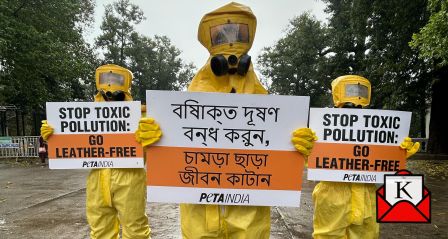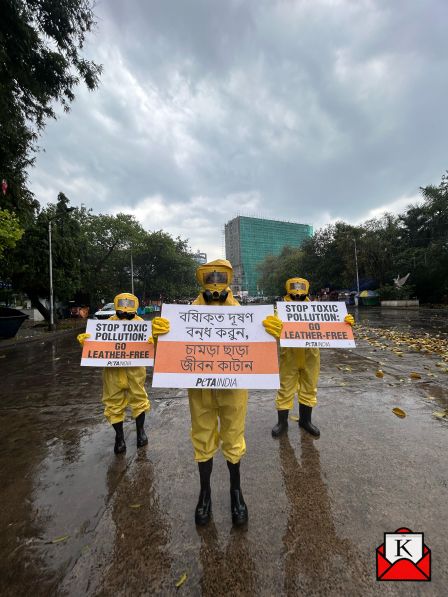PETA India’s Unique Protest About Death Of 3 Sanitation Workers


Three PETA India supporters, dressed in full-body biohazard suits, staged a striking protest outside the South Gate of Victoria Memorial in Kolkata in response to the tragic deaths of three sanitation workers at the Kolkata Leather Complex, who were allegedly exposed to the toxic waste produced by the leather industry. The demonstrators called attention to the industry’s deadly toll on people, animals, and the environment by holding signs that said, Stop Toxic Pollution: Go Leather-Free!. They also urged consumers to choose vegan fashions instead of deadly leather.
According to PETA India Campaigns Coordinator Atharva Deshmukh, “Leather kills people and destroys the environment in addition to costing the lives of billions of animals. The tragic death of three sanitation workers after reported exposure to toxic leather industry waste is a wake-up call for consumers to ditch leather and choose to wear vegan”.
The Kolkata Leather Complex, which is home to about 500 leather tanneries, has been connected to other tragedies. Three employees perished in 2015 as a result of breathing in harmful vapors from a leather processing facility.
According to the International Agency for Research on Cancer, leather dust exposure at work can cause cancer in people. Indeed, lung, pancreatic, skin, kidney, bladder, testicular, and other cancers have been connected to employment in leather tanneries, as well as respiratory and skin conditions.
In India, cows, buffaloes, and other leather-producing animals are packed into cars so densely that their bones crack. When an animal survives this ordeal, slaughterhouse workers cut its throat in front of other animals before dismembering and skinning it; these procedures frequently start while the animal is still conscious.
Mango pulp and sugarcane bagasse are two examples of eco-friendly vegan leather produced in India. Handbags, shoes, clothes, accessories, furniture, and home décor items made of vegan materials instead of animal-derived ones like leather, silk, wool, fur, and feathers are verified by the “PETA-Approved Vegan” certification. The “PETA-Approved Vegan” logo is used by more than 1000 businesses globally to help socially conscious Indian and international customers recognize vegan products when they shop.
For more details, visit: PETAIndia.com
Priyanka Dutta
